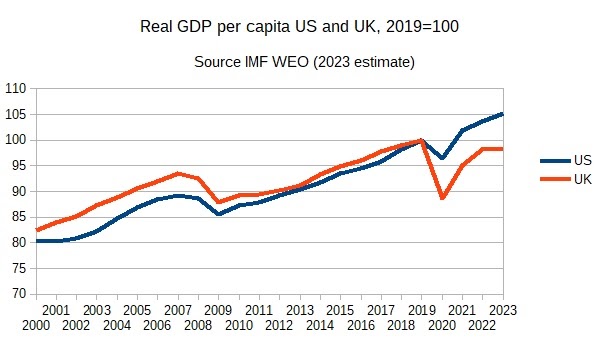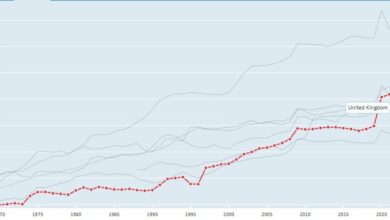
What
a future Labour government will be able to do in terms of repairing
both our broken public services, our broken economy, and getting
cheaper green energy will depend in part on its decisions about
fiscal rules. [1] When hopes and expectations are frustrated as a result
of these rules, you will hear a lot about how such rules are
neoliberal and should be scrapped. So are fiscal rules neoliberal, by
which I mean are they just instruments designed to suppress public
spending and cut taxes?
The
answer to my question is of course yes and no. First the no. Fiscal
rules arose out of a problem that can occur under any government,
including neoliberal ones. Politicians, particularly before an
election, will be tempted to increase spending or cut taxes and pay
for it by borrowing or creating money because for many voters that
seems costless: there appear to be only winners and no losers. This
problem used to be called deficit bias.
We
can see this happening right now in the UK, with the Chancellor
wanting to cut taxes in an effort to boost the government’s
popularity, and his own fiscal rules reportedly
constraining him in the amount he can do. When Trump was President he
and a Republican Congress cut taxes, mainly on the wealthy, by
increasing the deficit rather than cutting spending or raising other
taxes. He was able to do so because the US government does not follow
the golden rule, which aims to roughly match day to day spending
against tax revenue. [2]
Why
does it matter that politicians can fool voters in this way?
Increasing spending or cutting taxes when the economy is not in a
recessionary period [3] will increase aggregate demand, putting
upward pressure on inflation. The central bank will raise interest
rates to stop inflation increasing. Eventually a government is likely
to have to reverse the giveaway by raising taxes or cutting spending [4]. On both counts
there will be a cost to many people of unsustainable fiscal
giveaways. As long as those costs are not acknowledged by politicians
or the media, democracy suffers.
Other
reasons often given for the need to have fiscal rules are less
convincing in my view. It is often suggested that we need rules to
appease the financial markets. I see no evidence for this for any
advanced major economy. Did the bond markets refuse to buy US
government debt when Trump cut taxes? Have the bond markets raised
rates every time this Conservative government changed its fiscal
rules because the old ones would be broken? The Truss episode was
about
interest rate uncertainty
created by cutting taxes in a situation where spending plans were not
specified and might not have been credible if they had been, not
about breaking fiscal rules.
Another
unconvincing reason for having fiscal rules is that a higher level of
government debt will harm the economy. Again, for advanced major
economies there is no evidence of this. Will a higher level of
government debt impose a burden on future generations? It may or may
not, depending on the future relationship between interest rates and
economic growth, and the evidence from the past is that on average it
has not. It is particularly hypocritical to use this ‘burden’
claim to stop governments borrowing for spending that will benefit
future generations.
Making
our democracy function better by making governments more fiscally
responsible is nice to have but hardly of critical importance. It is
why I have often said that bad fiscal rules are worse than having no
rules at all. If you want a vivid illustration of this, compare the
recovery from the pandemic in the UK and US.
Eurozone
performance has only been slightly better than the UK. What do the UK
and the Eurozone have in common? Adherence to fiscal rules that have
constrained the recovery from the pandemic. If similar rules had been
applied in the US, we would probably not have seen the post-pandemic
Biden stimulus
and the Inflation
Reduction Act,
both of which have been important in making the US an outstanding
success in terms of economic recovery from the pandemic (as well as
reducing inequality, tackling climate change and a lot else as well).
One
class of bad fiscal rules are rules used to promote an ideological
goal, like shrinking the state. A clear example of a fiscal rule that
could be justly labelled neoliberal is one that limits government
spending but not taxes. Unfortunately a section of the governing
elite in Brussels has tended to see fiscal rules as a way of
constraining expenditure. When France initially raised taxes in the
early 2010s to reduce the deficit, then Commissioner
Olli Rehn said
“Budgetary discipline must come from a reduction in public spending
and not from new taxes.” But even rules that appear balanced may in
practice not be, which brings me to the UK’s debt to GDP rule.
Although
the fiscal rule that debt to GDP has to be falling by the end of five
years may (and I emphasise may for reasons set
out here)
be constraining this government’s ability to cut taxes, what it has
already done is reduced their plans for public investment, which is now set to fall steadily as a share of GDP over the next five years. Indeed,
when the falling debt to GDP rule is combined with the golden rule
then most of the time all the falling debt to GDP rule adds to the
golden rule is to place a limit on public investment. For that
reason, the falling debt to GDP fiscal rule could reasonably be
called the ‘reduce public investment’ rule.
Governments should always have robust means of deciding whether individual public investment projects are good value for money, and the more open these are the better. As long as this test is passed, what benefit can there be in constraining public investment at the aggregate level? Another
way to see why any fiscal rule that constrains aggregate public investment is a bad rule is to go back to reasons given for
having fiscal rules in the first place.
I
argued that fiscal rules are useful in stopping governments bribing
the electorate by cutting taxes or increasing spending and concealing
the costs by borrowing. But if public investment projects are
individually worth doing, it should be paid for by borrowing just as
an individual pays for a house by taking out a mortgage, or a firm
undertakes an investment by borrowing. Even the unconvincing reasons
for having fiscal rules don’t apply to public investment: future
generations benefit, debt is matched by useful assets that benefit
the economy and so on.
If
bad fiscal rules like the falling debt to GDP rule are worse than no
fiscal rules, why isn’t the second best of getting rid of all fiscal rules a
less risky way forward? Second best is reasonable when it is much
easier to achieve than the first best. But with fiscal rules the opposite
is true. There is no way a Labour government is going to abandon all
fiscal rules, whereas there is at least some prospect of it getting
rid of bad rules and keeping the better rules. In this particular
case, first best is more achievable than the second best.
In
opposition Rachel Reeves has already adopted the falling debt to GDP
rule, just as John McDonnell did. This rule and this alone is the
reason Labour are in such a mess over its sensible £28
billion pledge
to green the economy. In a rational world it would be obvious to
ditch the bad fiscal rule to enable desperately needed green
investment. In the run up to an election, with the media we have, we
are very far from a rational world.
But
once in government, what Labour says and does has to change, even if
their only goal is to be re-elected. With time and new leaders
memories of just how bad this Conservative government has been will
fade, and are in danger of being replaced with the disappointed
expectations of those that voted Labour expecting major change. Being
only slightly less bad than this current government will not see a
new Labour government last as long as the last one. For that very
narrow reason alone, one of a Labour government’s first acts needs
to be to discard the falling debt to GDP rule, or change it in such a
way as to prevent it constraining investment. Labour’s success in
revitalising our moribund economy will depend perhaps more than
anything on getting rid of this anti-investment fiscal rule.
[1] It will depend at least as much on their willingness to raise taxes.
[2]
I use ‘roughly match’ rather than ‘equal’ deliberately,
because there is no magic about trying to hit a zero current balance.
I also use ‘aiming to’ deliberately. For various reasons tax
revenue and spending fluctuate year to year and it would be bad
economics to try and suppress or counteract those short term fluctuations. Instead
policy should aim to hit a rolling target for the current balance in
five years time, using forecasts produced or verified by an
independent fiscal watchdog. For reasons discussed here, the OBR is
not sufficiently independent to play this role.
[3] Recessionary periods are times when there is either a significant
chance that output growth will be substantially below trend or
negative, output growth is substantially below trend or negative, or
the economy is recovering from output growth having recently been
substantially below trend or negative. During recessionary periods,
any fiscal rule should be suspended and fiscal policy should aim to
restore the economy to good health as quickly as possible.
[4]
Running deficits of a sufficient size to make the debt to GDP or reserves to GDP ratio
rise forever
is not sustainable. Eventually the government will choose to default
on its debt rather than raise taxes to pay ever higher debt interest,
or more probably inflate away the debt. For this reason advanced
economies do not permanently run these large deficits. It is
important to distinguish this situation, of unsustainable permanent deficits,
with a one-off but permanent increase in the level of debt to GDP
caused by temporary large deficit, which is sustainable.
Source link



